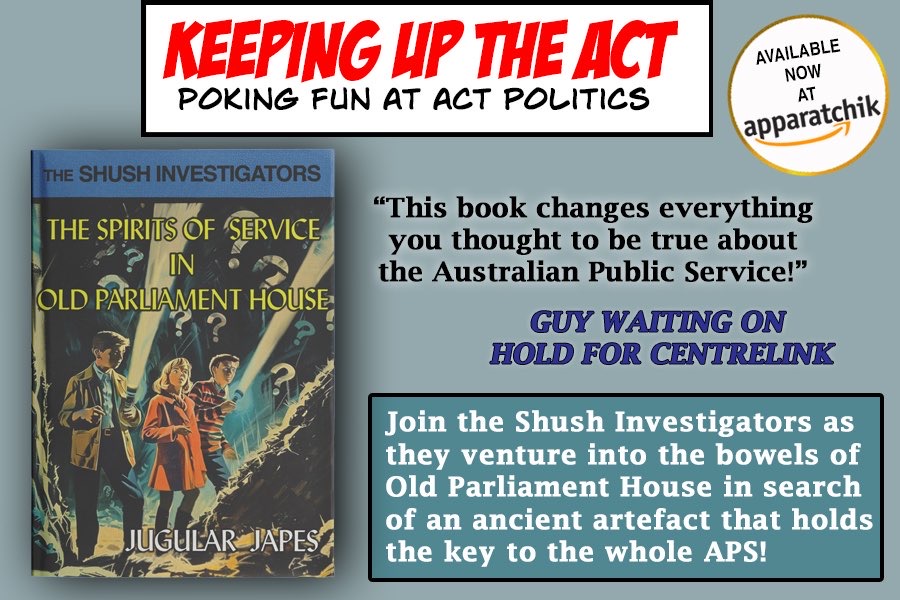Letter writer MIKE QUIRK, of Garran, says that when it comes to the tram the ACT government either gives the most superficial of answers or more commonly, silence. Its approach is the antithesis of transparent and accountable governance.
COLUMNIST Ian Meikle (“Seven Days”) and correspondents in “CityNews” (November 10) outlined numerous issues with the light rail project.

The most alarming is the government’s inability to justify the project. It either gives the most superficial of answers or more commonly, silence. Its approach is the antithesis of transparent and accountable governance.
It has relied on the lack of engagement of many in the population with local issues despite the significant and increasing impact those issues have on well-being.
These impacts include the poor use of limited infrastructure funds, increased hospital waiting times, increased congestion, the absence of convenient public transport, inadequate maintenance of roads, bridges, footpaths, open space and cycleways, the poor quality and design of housing redevelopments and the lack of appropriate, affordable and secure housing.
These poor outcomes suggest the Liberal opposition, if it can persuade the electorate it has shaken off the Zed millstone, and quality independents could be in a position to challenge for government.
The government’s simplistic, ill-considered strategies (eg light rail good, other forms of transport bad; high levels of redevelopment good, adequate greenfields supply unnecessary) are a result of insufficient analysis.
To paraphrase George Bernard Shaw: for every complex problem there is a simple solution – it is always wrong.
Its approach is indicative of a lazy and arrogant government largely unchallenged in its 22 years in power
The community deserves a government that bases policy on evidence not political expediency.
Mike Quirk, Garran
Andrew fiddles as Canberra fails
ACCORDING to a well-known expression, Rome’s emperor at the time, the decadent and unpopular Nero, “fiddled while Rome burned”. The expression has a double meaning: Not only did Nero play music while his people suffered, but he was an ineffectual leader in a time of crisis.
If you hang around long enough, history has a habit of repeating itself. In 2022 it could be said that our very own Nero (Andrew) oversaw this city’s decline by diverting precious scarce funds into a rattling tram instead of wider more pressing issues better benefiting his citizens and city.
John Lawrence via email
Howzat! Author bowled out of literary award
HOW simple it is that guidelines for a literary award in Canberra can exclude a Canberra writer.
I am the author of “The Glass Cricket Ball”, a story about the artist Napier Waller and his sublime creation of the Hall of Memory at the Australian War Memorial (see Helen Musa, City News June 23). I have lived in Canberra for most of the last 55 years.
“The Glass Cricket Ball” was conceived many years ago when I was a voluntary guide at the AWM. It was written by me in Canberra during the last two years when I was a resident of the suburb of Bruce.
Okay, rules are rules. A few months ago I moved over the mountain to a retirement village at Tumbarumba and am therefore technically a NSW resident.
I am not an award seeker. I just hope “The Glass Cricket Ball” will be seen by readers as a very Canberra story, regardless of the rules.
Jan William Smith, Tumbarumba
It’s about more than the stars
BUMPING up dwelling EERs by a notch is a relatively easy task for state and territory ministers, and no doubt can be very beneficial for individual occupants of new homes if the higher standards are consistently monitored and enforced.
However, EER box ticking does not address the wider public costs of having larger homes on smaller blocks, siting towering high-rises with small and generally hard-surfaced surrounding footprints, having fewer trees able to shade private land and large, hard heat-retaining vertical walls and ground-level surfaces, allowing swathes of new suburbia to still face east-west, approving the use of dark roofing and having too few and also poorly-sited street and other public-space trees with wide canopies.
Our ministers and planning authorities cannot afford to turn a blind eye to the need for all urban densification areas to at least include bigger setbacks, and substantial additional and adjacent open, green and well-treed spaces for the use, comfort and well-being of not only thousands of new residents but also the greater number already living nearby.
The tunnel-visioned, yet lucrative focus on cramming in more “residential, residential and residential” at the expense of anything else, means a poor start already on mitigating the urban heat generation and heat trapping that is occurring across these large precincts and beyond. It is hard to have faith that many of the above contributing factors will be counteracted in timely and less piecemeal ways, not only by the still obtuse ACT planning reform package but also by the ACT government’s many existing plans and strategies that modestly aim to increase our urban forest, cool the city, ensure tree canopy for residential blocks and improve liveability and well-being in general.
The public deserves more honesty and transparency from ministers and local MLAs about progress made on addressing these physical liveability and amenity issues, well before the next election.
Sue Dyer, Downer
Our priority is to climate-proof Australia
DO I detect a whiff of Greens’ sanctimony in Peter Lyons’ comments on my letter (CN October 27) about Australia’s greenhouse gas emissions? It is true that the majority of countries have emissions less than Australia, including France and the UK, both of which have significant nuclear and hydro sources. In fact, Australia is about 15th on the ladder.
It is a fruitless task to compare whether emissions by countries are equitable or not, given vast differences in population, industrialisation, natural resources mix and topography (a big factor for Australia).
The point of my letter was that, at about 1.2 per cent of world emissions, no matter what Australia does and spends on renewables in the hope of reducing its emissions, it will have zero effect on global warming let alone climate change.
Our priority is to climate-proof Australia, not waste billions on wind and solar renewables and hugely expensive and invasive infrastructure (poles and wires) for zero return.
On the question of nuclear energy, China may be developing its solar and wind energy generating capacity at a fast rate but is also developing 150 nuclear power stations (as well as fossil fuel-powered plants), in recognition that renewables will never be able to meet its ultimate demand for electricity.
France and the UK have operated nuclear plants for decades without incident. The UK is currently building a large nuclear plant. Small modular reactors show a lot of promise; after all, they have been used to power ships and submarines for many decades by Western powers without incident.
The greatest hurdle to nuclear energy in Australia is the absurd policy of having banned it, yet we are hypocritically happy to export our uranium.
Finally, the argument that Mr Lyons makes that Australia must get its 1.2 per cent emissions down because so many countries have fewer emissions (they all add up to some 25 per cent), is pure Greens’ sophistry. And his argument about my contribution to income tax, which I am happy to pay, as I have done all my life, is pure crooked thinking (argument by imperfect analogy).
Max Flint, Erindale Centre
China has big plans for nuclear energy
CHINA may well be developing solar and wind faster than nuclear power as asserted by Dr Mackenzie (Letters, CN November 10).
However, it also has big plans for nuclear (Letters, CN November 3), and why not given that it will provide firming power, which solar and wind are unable to do.
That aside, it is still building coal-fired power stations at quite a rate as well.
Chris Rule, Conder
Let our engineers lead on energy
AUSTRALIA is ideal for small, modular nuclear reactors distributing energy. We have the uranium and ideal storage on a geologically stable plate, ready to be reused, when future technologies unlock its potential.
Those inefficient Chinese solar panels (check your warranty) have a two to three-year footprint and are losing efficiency fast, with no government policy on disposal of this toxic waste.
The renewable dream is a disaster in progress for Australia, which can be averted but only if we let our engineers lead with logic and facts, rather than our idealogue pollies and conflicted scientists.
Ken Murtagh, Hughes
Hydrogen has been used for many years
VI Evans (Letters, CN November 17) is wrong again.
Hydrogen is not at the “experimental” stage: it has been used as a fuel, either in fuel cells, or – less commonly – in tanks for several years.
In January, Fortescue Metals purchased, to replace almost half of its Pilbara iron-ore mine haul trucks, battery and hydrogen-powered trucks. There are now also at least three hydrogen fuel-cell vehicles, from Honda, Hyundai and Toyota, in production and on the market.
Hydrogen is not “very expensive to produce” if solar energy is used as, for example, by Fortescue. It is not very difficult to transport if double-layered, vacuum-insulated tanks are used.
And hydrogen is not “explosive” unless, as was the case with the Hindenburg airship disaster, ignited by a careless flame.
Dr Douglas Mackenzie, Deakin

Canberra’s made for social walking
REMEMBER Norm and Life. Be In It? ACT Walking for Pleasure is an initiative still going strong over three decades later.
Why the longevity? It’s partly in the name. We were supposed to be an activity that was relaxing, refreshing and fun, to get older Australians, like Norm, off the couch. We still take the “pleasure” part of our mission seriously.
It’s also Canberra. Where else can you go for a bush walk or find 360 panoramic views, only kilometres from the CBD? It’s as if we were designed for this place, and this place was designed for us.
ACT Walking for Pleasure offers morning walks, Tuesday through Sunday, most days of the year, throughout Canberra and surrounds. With over 350 members to design and lead walks, there is plenty of variety on offer. And you get to discover all sorts of hidden treasures in Canberra you didn’t know existed.
All walking abilities are catered for. About half our walks are two hours long, which is basically your 10,000 steps. But we have a one-hour Thursday stroll for those with limited mobility, all the way to longer, all-day walks twice a month.
Ken Finlay, president, ACT Walking for Pleasure
(actwfp.org.au or email info@actwfp.org.au)
I’m devastated, nailed to the floor!
I’M devastated! Peter Robinson (Letters, CN November 17) has nailed me to the floor with his assertions I’ve got the goals and motivations of the Voice all wrong.
Furthermore, I am nothing short of condescending in offering advice on the topic despite it being sourced from Constitutional experts, noted historians and, critically, highly respected national indigenous elders. I am also “strangely religious” it seems and have been blind to the “lashings of political spin” in the Voice proposal.
Oh well, I guess I’ll just try and console myself with Disraeli’s observation: “How much easier it is to be critical than to be correct”.
Eric Hunter, Cook
Who can be trusted?
In a world of spin and confusion, there’s never been a more important time to support independent journalism in Canberra.
If you trust our work online and want to enforce the power of independent voices, I invite you to make a small contribution.
Every dollar of support is invested back into our journalism to help keep citynews.com.au strong and free.
Thank you,
Ian Meikle, editor





Leave a Reply